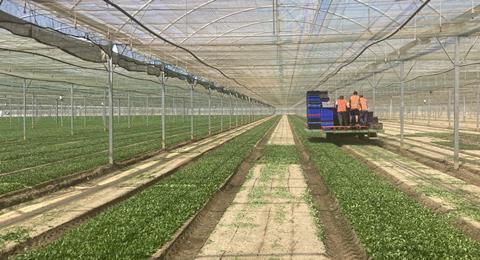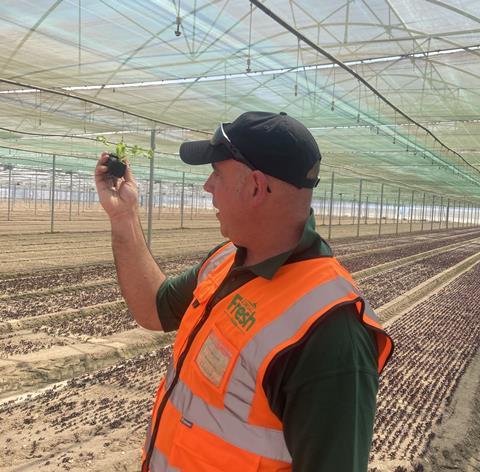At its salad production sites in both Suffolk and Essex, the owner of the Florette salad brand aims to deliver on its promise of freshness while boosting the biodiversity of the local area

Since investing in farming operations in 2019, French cooperative Agrial, owner of the Florette brand, has made significant strides in UK salad production, establishing itself as the country’s sole commercial grower of lamb’s lettuce and one of the largest producers of protected baby leaf.
Head of farming at Agrial Fresh Farms, Andy Knaggs explains that the company’s wholehead production - iceberg, cos, Apollo, Batavia, Lollo Rosso, endives and radicchio - has largely shifted to Suffolk, beginning in 2021. The region’s sandy soils provide greater planting flexibility, he reveals, while its coastal climate offers valuable frost protection.
In Colchester, in Essex, Agrial’s UK farming set-up includes 27ha of tunnels, and remains the hub for lamb’s lettuce as well as rocket and spinach production, and where biodiversity and sustainability are central to the company’s approach.
“We’re part of LEAF (Linking Environment and Farming) and schemes like No Mow May, we’ve installed bee hotels and bat boxes, restored habitats for red-listed species,” says Knaggs. “We’ve seen a real increase in ladybirds and hoverflies, the natural pest controllers.”
Though leafy salads don’t rely on pollination, Agrial’s farms act as biodiversity corridors connecting different habitats in the area, Knaggs explains. Agrial was recognised by Defra through its Bees’ Needs initiative for efforts to promote bee populations, and continues to adapt hedgerow management to enhance wildlife habitats.
“Indoors, we deliberately keep chemical use to an absolute minimum,” Knaggs points out. “Instead, we rely on Integrated Pest Management and strong farming practices to keep crops healthy. Some herbicides are technically available, but they can conflict with certain crops, so we’ve chosen a non-chemical route, using soil steaming, which fits with our commitment to sustainable production.”
Core salads
Lamb’s lettuce is very much a unique selling point for Agrial, since no one else produces the crop in the UK. “Many have tried,” jokes Knaggs.
A harvester makes its way across the sandy soil, cutting the root of the lamb’s lettuce, which is then conveyed over an air bridge to a shaker belt to remove any remaining sand, insects or stones.
“We try to avoid irrigating before the harvest so the sand comes off easily,” reveals Knaggs. “Typically in Nantes, the leading region for lamb’s lettuce production, the growers would wash it, transport it to the factories, and then wash it again. This helps with the sand, but doesn’t necessarily help with the life of the product.”

Florette growers have also put a lot of time and effort into getting rocket right, according to Knaggs. “Rocket’s one of those crops that we can multi-cut, and the more cuts you get from it, the stronger it tastes and the more robust the leaf is,” he reveals. “So there’s been a big push to get the timings right. Post-harvest, we use a mechanical hoover to re-trim the plant just above the ground and suck up any loose crop debris. This helps to reduce the amount of bolt in the crop because the flowers of rocket are actually a contaminant, so you don’t want them in your salad bags or sandwiches.”
Trying to achieve a third cut during the high temperatures and long daylight hours of a UK summer is a challenge, Knaggs explains. “Especially indoors, it’s a really fast crop, going from seed to harvest in just 21 days, which means it can race through its growth cycle,” he says. “But the hoovering has certainly helped improve both yields and quality.”
Change on the way
Peat, long valued for its moisture retention and planting consistency, is under increasing scrutiny due to environmental concerns, and government plans indicate it may be phased out in the coming years. “The direction of travel is clear,” says Knaggs. “The big question is when. It could be 2030, it could be sooner, but as an industry we need to be ready.”
Agrial is a member of the British Leafy Salads Association (BLSA), where Knaggs sits on the board and chairs the R&D committee. Within the BLSA, a dedicated subgroup has been established to develop the industry’s roadmap towards becoming peat-free, operating trials and evaluating alternatives such as coir, vermiculite, wood chip green waste and new propagation and planting techniques. Replicating peat’s reliability, however, remains a significant challenge, particularly for automated planting systems.
To meet this challenge, Florette is trialling a system called PlantTape, a transplanting method that uses biodegradable paper tape containing plugs grown in a peat-free mix, typically based on coir and vermiculite. The system delivers precise plant spacing and enables efficient mechanical transplanting, but its design is different from conventional blocks and brings its own growing challenges, according to Knaggs, particularly in early crop establishment.
“It encourages a strong taproot, which can improve water and nutrient access,” he says. “Trials suggest there’s a potential opportunity to also reduce irrigation use by 20-30 per cent when conditions and management are right.”
The company is working with multiple seed houses on varietal development, focusing on traits ranging from improved disease resistance and flavour to innovative concepts such as Crystal lettuce from Rijk Zwaan, an open iceberg type with frilled, crunchy leaves and the Knox trait, which helps delay oxidation and extend shelf-life.
“With changing seasonal patterns and rising summer temperatures, we may also need to consider traits like drought and heat tolerance in iceberg varieties, taking inspiration from those grown in warmer regions such as Spain,” Knaggs predicts. “It’s all part of ensuring we deliver on Florette’s guarantee of freshness.”



